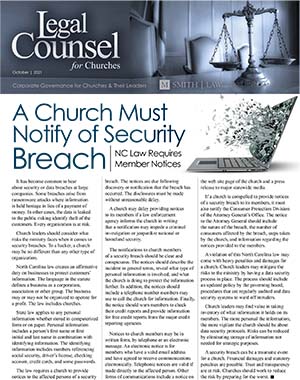Individuals who serve in an official capacity for an organization risk personal liability for their actions.
Civil liability includes monetary damages in a lawsuit where one party alleges the actions of the officer harmed them. Corporate officers often purchase liability insurance and enact policies that provide for indemnification from civil liability.
As a matter of law, church directors and officers are ordinarily immune individually from civil liability for official church actions. This is a public policy position taken in North Carolina and codified in the State’s statutes.
However, the State’s immunity statute for church officers is not absolute. This protection comes with stipulations. Here are the conditions where a church director or officer may lose the immunity shield.
Compensation Standard
North Carolina law allows churches to pay their directors and officers. Church officials who are compensated for their services lose the automatic immunity protection. Compensation is defined as payments that go beyond the reimbursement for expenses. Compensation puts church officials in the position as for-profit officers. All other defenses, such as insurance, may be available in a lawsuit.
Scope of Duties Standard
All church directors and officers have limited authority. So long as an officer is performing as the position allows, the immunity defense may be preserved. Church officials who do not act within the scope of official duties may lose the automatic immunity defense. If a church officer exceeds his/her authority, the protections may not apply.
Bad Faith Standard
Church officials are expected to perform their duties with good faith. Good faith generally requires that church officers act honestly and faithfully execute their responsibilities. Church directors who take advantage of the church by acting with selfish motives do so with bad faith. Bad faith violates an officer’s fiduciary duties. Bad faith is a reason the State’s immunity protection may be withdrawn.
Negligence Standard
A church director or officer who commits gross negligence or willful or wanton misconduct that results in the damage or injury to someone risks losing the immunity guard. Gross negligence or wanton misconduct is such reckless disregard for the safety of others that it appears to be a conscious violation. Willful conduct is intentional disregard for others.
Motor Vehicle Standard
A church director or officer who incurs liability from the operation of a motor vehicle is prone to lose the immunity safe harbor. The public policy on operating a motor vehicle is so serious that no one is given an automatic pass on this responsibility.
Unlawful Loan Standard
A church director or officer who votes for the church to make a loan or issue a guarantee is personally liable to the church if the officer violated his/her duty of good faith and care. If the loan is impermissible, the borrower may not use the immunity to avoid liability.
It is important to note here that the State immunity protection is personal to directors and officers. This immunity does not immunize the church against liability for the acts or omissions of the directors or officers. Churches should undergo a thorough discussion about minimizing its risks.

